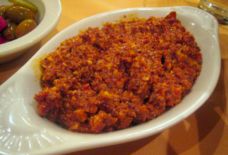Pousadas – Portugal's Route of History and Gourmet Delight
By: Habeeb Salloum/Arab America Contributing Writer
About 5 km (3 mi) from Lisbon, on the road to Sintra, we stopped at the charming pink 18th century Queluz National Palace, called by a number of writers, ‘Portugal’s Versailles’. Here, amid its splendour, we had our first taste of Portugal’s pousadas – the country’s inns, built in historic structures. Classified as national monuments, they ooze with history and gourmet delights.
When we arrived, Queluz’s ‘Pousada Torre de Relógio-D. Maria 1’, housed in the former quarters of the manor’s palace staff, had been opened for only a few months. Exploring the rooms and their furnishings, we were thrilled with the atmosphere. There was an aura of historic luxury in the midst of a modern atmosphere.
The Pousada’s impressive Clock Tower overlooked, across an empty space, the Palace’s graceful façades. Inside, this former summer seat of the Portuguese royal family, overflowed with embellished interior halls and luxurious gardens dotted with Baroque fountains, marble vases and statues. We ended our visit at the palace kitchen which, at one time, served the Imperial Court in summer. While enjoying a lavish meal in this historic eating place, now converted into the Pousada’s ‘Cozinha Velha Restaurant’, our host André de Carvalho remarked, “The meal you are eating is this region’s specialty. Every pousada in Portugal features the food of its countryside. You must try some of the others.” I smiled, “If they serve food like this, it would indeed be a delightful gastronomic journey to travel the pousadas’ gourmet route”, I thought to myself, as I gulped down yet another tasty morsel.
Those like us who have travelled the pousadas’ circuit can thank Portugal’s 1940 Minister of Information, António Ferro for these lodging places. In that year, he decided to begin building ‘Regional Pousadas’ to quarter and feed travellers with a hospitality in the style and tradition of each region. In the following years, they were to make Portuguese vacations both an art and a pleasure.
The idea was to salvage dilapidated historic buildings and re-create, as genuinely as possible, the regional characteristic of architecture, reflect the territorial culture and provide local foods and wine. Inspired by the medieval roadside inns that were strategically located along frequently travelled roads, the ‘Regional Pousadas’ were soon to draw a never-ending stream of visitors.
The first of the ‘Regional Pousadas’, a mirror of those which were to follow, took its inspiration from local architecture. It was located on a site with special appeal and opened its doors on the 19th of April 1942, in the town of Elvas in the province of Alentejo. During the 1950s, a new kind of pousada was born: the ‘Historic Pousada’ situated in restored monuments like castles, palaces, monasteries, and convents. Both types were to have common attributes – the comforts of modern day living integrated with the historic original structure.
These pousadas today are perched on the crowns of mountains; others are located deep in forests; on the edges of peaceful lagoons; or in regions noted for their scenic beauty. However, no matter where they are situated, the pousadas offer the serenity of a bygone age and retain an authentic flavour, reflecting the region or a historic site.
One feature in common to all pousadas is that they are small scale. Few have more than 30 rooms. This gives a chance for their employees to provide personalized service to each guest. Hence, they offer the visitor unparalleled hospitality and quality service. Every moment of the guest’s stay, every meal of the day, is made special by the attentiveness of the staff – much more noticeable than in modern hotels.
All pousadas’ cuisines reflect the local tradition and regional food ingredients. A good number have earned a well-deserved reputation for the quality of the food and wine they serve. They are famous for their outstanding menus, décor, and extraordinary surroundings. Offering an excellent taste of the culinary talents of their chefs, they are much sought-after eating places, even by the inhabitants of the country.
Besides enjoying fine dining, guests can join in local festivities which take place on holidays and saints’ days. They are also able to bargain in the local markets and meet the friendly country people. For those interested, many of the pousadas feature displays of local paintings, art, and crafts – a pleasant way of concentrating on Portugal’s rich cultural contrasts.
Throughout the country, there are, at present, 44 pousadas. Enatour-Pousadas de Portugal has been, on an ongoing basis, upgrading old pousadas and taking over and restoring and adapting historical buildings to these high standard hotels. The company’s 1,100 employees are well-trained and seemingly enthusiastic about their work.
During the pousadas’ 80 plus years of history, some 70% of their guests have been from outside the country – an important source of foreign exchange. Tourism, employing about 7.5% of the working population and the second most important source of foreign exchange in the country.
For individual travellers, small groups, or executives in search of something new, other than regular hotels, the pousadas are the ideal solution. Travelling from pousada to pousada give one the taste o the history and life of the country – a glimpse into its very soul. It is quality tourism at its best.
During our last day of our ‘pousadas’ journey’, we visited ‘Lóios Pousada’, a former monks’ convent, in Evora, then drove through the surrounding countryside, luxuriating in the richness and beauty of inland Portugal. That evening, at ‘Pousada Rainha Santa Isabel’ in Estremoz, amid the austere magnificence of a hill-top medieval castle, named after Queen Isabella of Aragon, who once called it home, we delighted in the paintings and tapestries of the past. After dining on a sumptuous meal, we sat by a window watching the village whitewashed houses, facing the endless plains. It was a fitting end to our pousada tour – a unique adventure and a pleasurable lesson in the history of Portugal.








